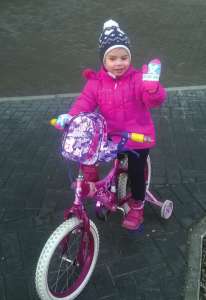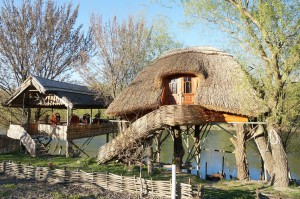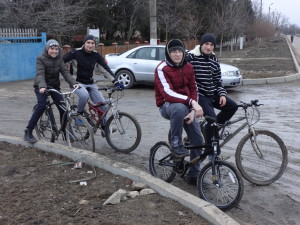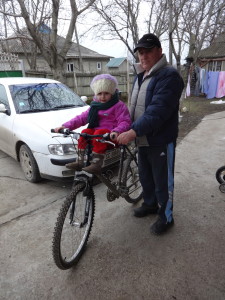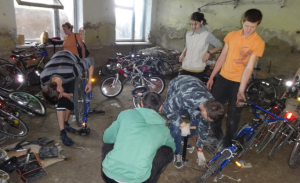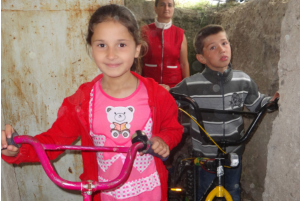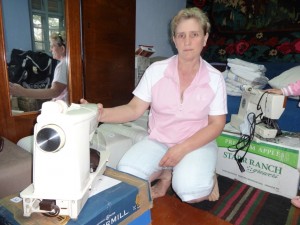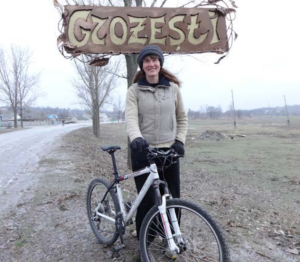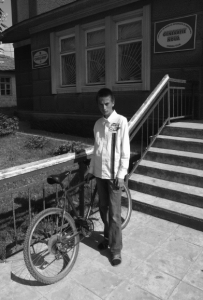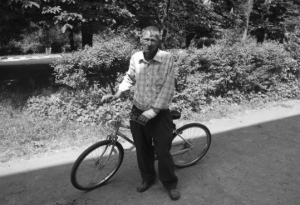by Andrei Rusanovschi
Fall 2005 InGear
He started repairing old Soviet bikes in his apartment to earn money for food. He built up his skill of talent and sweat. Bikes have changed his way of life and he changed the way bikes run across Stefan Voda and, ultimately, across Moldova.
Stefan Voda is a small city, situated not far from the Black Sea, and not too far from the capital of the Republic of Moldova, Chisinau, but far enough to have its unique salt and quietness.
Since ’91, after the fall of Soviet Union, many aspects of Moldova’s infrastructure were ruined, including the roads and public services.
Stefan Voda’s public transport system has never been petted; by anybody. The system has simply never existed. That is why bikes play such an important role in connecting the so-called private sector with the center of the town.
In Stefan Voda the bike shop is in the building of the Maria Biesu School of Arts. Walking down the steps to the shop one senses little by little the smell of rubber. The smell has already became characteristic and is readily associated with bikes — no other place in Stefan Voda has that many and such a big variety of them. Everyone knows “if you want good bikes at good prices, go the store in the basement.”
The bike shop, once a messy and unorganized place, now looks like it found a master. The room that once was too small to house two hundred bikes is now transformed into a neat bike store and a fitting shop, accommodating four hundred plus bikes of different sizes, models and function.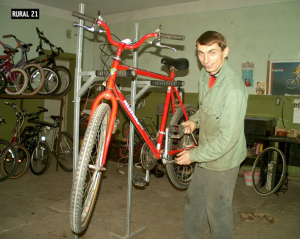
When you enter the shop you see an energetic guy, always busy with fitting the bikes and making the place better. He even makes his own bike stands, inventing modifications, building bikes virtually from nothing. In comparison, it is quite simple to prep bikes in such good condition as those from Pedals for Progress.
To a big extent, it is due to Valeriu that the Moldova #3 project became possible, or at least potentially viable, says Vitalie Rusanovschi, director of Center Rural21, the NGO that administers the project in Moldova.
Valeriu started repairing bikes in his small one-bedroom apartment. “I never thought I would deal with bicycles on the professional level,” says Valeriu. “I just liked riding them when I was little. And, as a kid, I always liked to see what’s inside.”
After the Army I had to choose what direction to take, says Valeriu. I decided to go further with my education and studied automobiles. While studying in Chisinau, fate brought me together with a bike service center. This is when I began to study the subtleties of bike mechanics.
Now he works with Center Rural21, the regional NGO promoting democracy, healthy life style and sustainable development. The Pedals for Progress project is running in Moldova for the third time. The previous two shipments made essential improvements to the public transport infrastructure. It is readily visible when coming to the town.
“I could instantly see that Stefan Voda is now much better equipped with bikes than ever before,” says Mark Skelton, the Peace Corps Volunteer in Moldova who was the first to contact Pedals for Progress in 2002, arranging for the first shipment of bikes from the USA. Mark visited Stefan Voda during the second week of August 2005. It had been two years since he finished his duty in Moldova with Peace Corps.
“I am impressed how Valeriu has organized his workplace,” says Mark. “It is neat and well structured, and it seems he improves it every second,” says Mark after a half-day visit to the bike store.
“The best gratitude for me would be the bike I fit to never come back for repair,” says Valeriu. “I will just welcome them at least once a year for maintenance work.”
The Pedals for Progress project proved to be sustainable and a long-lasting relationship, and with Valeriu Soloviov responsible for the fitting process, we will fill Moldova up with reliable, environment-friendly means of transport — bicycles, said Center Rural21 director, Vitalie Rusanovschi.

